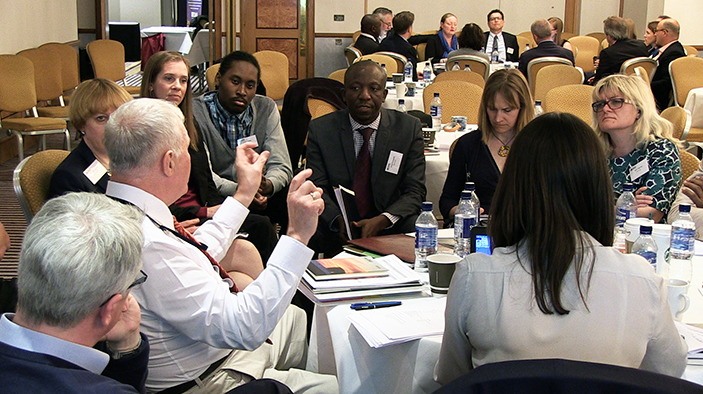DAI Workshop Explores Systemic Market Development
May 06, 2015
More than 90 practitioners from around the world convened April 28–29 in London for a workshop titled “Pushing the Frontier: DAI’s Experience in Systemic Market Development for Inclusive Economic Growth.”
The event explored how economic development programs are increasingly adopting market systems development approaches. DAI is implementing 36 economic growth projects with a combined budget of more than $1 billion, serving different clients and operating under different conditions but all with the ultimate goal of increasing sustainable and inclusive economic growth.

“How do we serve as facilitators rather than market actors?” asked Bill Grant, DAI’s Global Practice Leader for Market Systems Development, in his keynote address. “It’s not just about getting one market player to adopt the right behaviors, or even getting others to follow. It’s about changing the market system such that these behaviors are enabled and facilitated, all while remaining invisible so that market actors see the market system working.”
“Pushing the Frontier” featured a headline panel that included Patricia Seex, Head of Profession for Private Sector Development for the U.K. Department for International Development (DFID); Alex Duncan of The Policy Practice; and David Elliott, a Director from the Springfield Centre, who addressed an audience of more than 100 people at the Hilton Metropole. Other panels discussed topics such as scaling up for impact, reaching the smallest farmers, monitoring and evaluating the impact of market development, implementing systemic approaches to business linkages, and including women and girls.
Some 85 DAI employees participated, including 25 field staff from 20 economic growth projects, 22 people from DAI’s Bethesda team, and 38 from our U.K offices. They were joined by select practitioners from consortium partners, the private sector, and international donor agencies.
Participants discussed the principles of market systems development while recognizing that every market, country, and region presents unique conditions, challenges, and opportunities: hence DAI’s commitment in every engagement to in-depth political economy analysis, rigorous value chain mapping and analysis, and locally driven consultation and programming. “Context is key,” said Bhairav Raja, who moderated a panel on ensuring that financial sector deepening strategies are designed to reach the poor and the poorest of the poor.
The workshop stemmed in part from a September 2013 memorandum of understanding between the U. S. Agency for International Development (USAID), DFID, and the Swiss Agency for Development and Cooperation (SDC), which outlined their commitment to promote market systems programming, focusing on the Making Markets Work for the Poor (M4P) and Value Chain Development approaches.
“There are differences in the vocabulary of the different models and the visuals used to present them,” said Grant. “But the underlying objectives are the same: to achieve long-term sustainable impact at scale. To do so, we need to focus on the entire market system, which is comprised of the relationships between the core actors, the supporting functions that make the core value chain work, and the formal, informal, and social rules that govern the systems.”
“The panels allowed us to explore the different approaches used between USAID- and DFID-funded projects,” he continued. “It’s clear that many of our projects can improve their market systems approaches by taking the project out of the direct line of paying for activities that should be driven by the private sector and purchased by the beneficiaries.”
RELATED CONTENT:
DAI Hosts Third Mandela Washington Fellow
DAI is delighted to welcome Soilihi Massoundi as part of the Mandela Washington Fellowship for Young African Leaders.
Read More